Football is dying. Soccer is rising. How this changing Southern town is coming together
CROSSVILLE, Ala. − The homecoming queen stopped the halftime show.
For a confusing couple of seconds, the stadium announcer went silent. The band stopped. The flag twirlers took a knee. The few hundred people in the stadium had no idea what was happening, so they raised their camera phones in case it was something important.
And it was.
Newly crowned Juleydi Franco Ramos, a senior in a sparkling black gown, walked away from her escort and took off her tiara. Ramos approached Liliana Pahuamba Roque, who had also been nominated for queen and was sitting in a wheelchair.
Ramos placed the tiara on a stunned Roque's head.
The announcer, who wasn't in on the surprise, got a signal from Crossville Principal Jon Peppers to read from a script that had been kept secret until that moment. The announcer told the crowd the queen had "forfeited her crown."
What everyone at the Crossville High football field witnessed on that September night was an unrehearsed act of kindness they are still talking about in this little farming community of northeast Alabama. It may have been the last Crossville High football game that will ever host a homecoming halftime show, but that's only a sliver of the story.
What people in Dekalb County may not have known was that both girls showed grace in that moment after their lives had been filled with so much pain. But that, too, is only a part of Crossville's new narrative.
In this changing community, where 85 percent of the city of Crossville's population of 1,830 is white and 85 percent of Crossville High School students are Latino, residents, no matter their race or heritage, recognized the homecoming queen's selflessness and saw a common, small-town bond. While language and culture may be barriers, people in Crossville agree kindness is something they all can share.
Northeastern Alabama is in the midst of a rapid cultural change that is reflected in its shifting demographics. Like so many regions across the South, the white population is receding while the Latino population is growing.
For instance, in Alabama, Tennessee, Arkansas, Mississippi, Louisiana and North Carolina, the white population has dropped between 2 and 3.5 percentage points since 2010.
In Tennessee, for example, Montgomery County has the fastest-growing Latino population (up 2.9 percentage points since 2010) while the white population has dropped by 6.3 percentage points. The large Latino enlistment in the military, with a base at Fort Campbell, contributes mightily to the rising Latino numbers.
The contrasting demographics in Northeastern Alabama were most stark in 2011 when Alabama law HB 56 was passed, allowing police wide discretion in contacting people who they had "reasonable suspicion" were undocumented. It imposed penalties for employers who hired undocumented workers and landlords who rented to undocumented immigrants.
The Latino and white communities, driven apart by that law, came together in 2013 when a tornado with 125 m.p.h. winds destroyed part of the largely Latino community outside Crossville. At the time, then-assistant police chief Jacky Clayton saw the white and Latino communities coming together in the aftermath and called it "brotherly love."
Crossville's crossroads are familiar across the South.
And in Crossville today, some people are trying to bring the Latino and white communities together.
Two queens from Kilpatrick
The two girls at the center of the homecoming queen switch don't live in Crossville, neither do most of the Crossville students.
They live in a neighborhood called Kilpatrick about five miles outside of town. It's a community of mostly immigrants, with most Kilpatrick adults working for about a dozen chicken plants (Koch, Tyson, Pilgrim's and others) in the surrounding area. Many Kilpatrick residents are undocumented and the area has been called "Little Mexico" or "Little Tijuana." Most of the residents are from Mexico, but many of the newer arrivals are from Guatemala or Honduras.
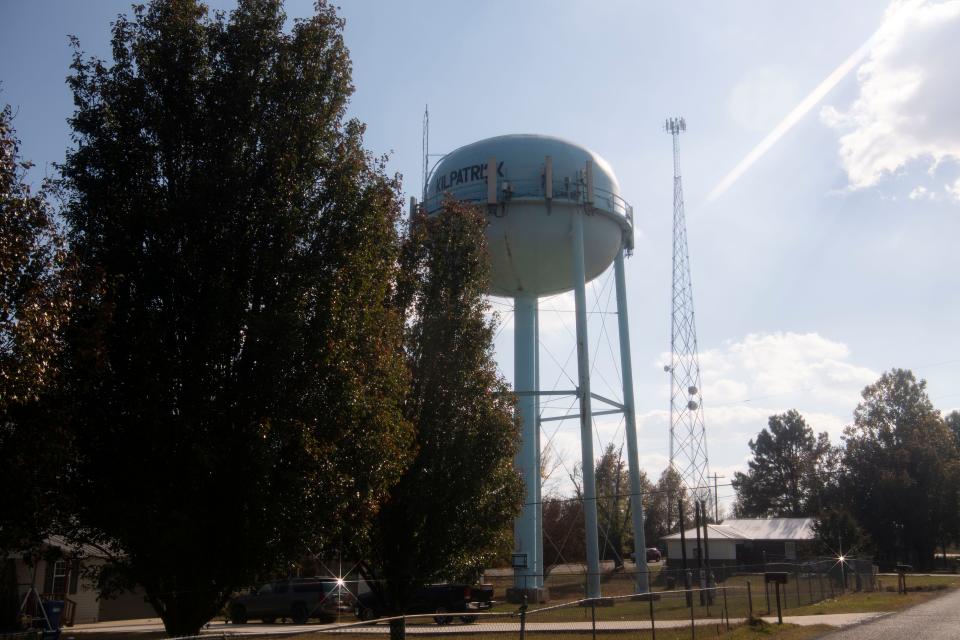
Kilpatrick is a sea of single-wide trailers, some of them filled with more than one family. The roads are mostly unpaved, with power lines running overhead. The sounds of bawking chickens and barking dogs mix with car tires rustling over gravel and give Kilpatrick the constant din of an orchestra warming up for a performance.
Lily Roque, 17, called Kilpatrick "a good place to grow up" because she and her family have always been together there. Her sister Alicia, a 2017 graduate of Crossville High, works in the human resources department of a local chicken plant.
Lily said she isn't going to college. She plans to work with her sister after she graduates from high school.
Roque was born with a condition called congenital dyserythropoietic anemia, which means her body doesn't produce enough red blood cells. As a result, Roque is too weak to stand for more than a few minutes. She uses a walker and a wheelchair. In local media, which covered the story of her receiving the homecoming crown, many outlets misidentified Roque's condition, calling it cerebral palsy.
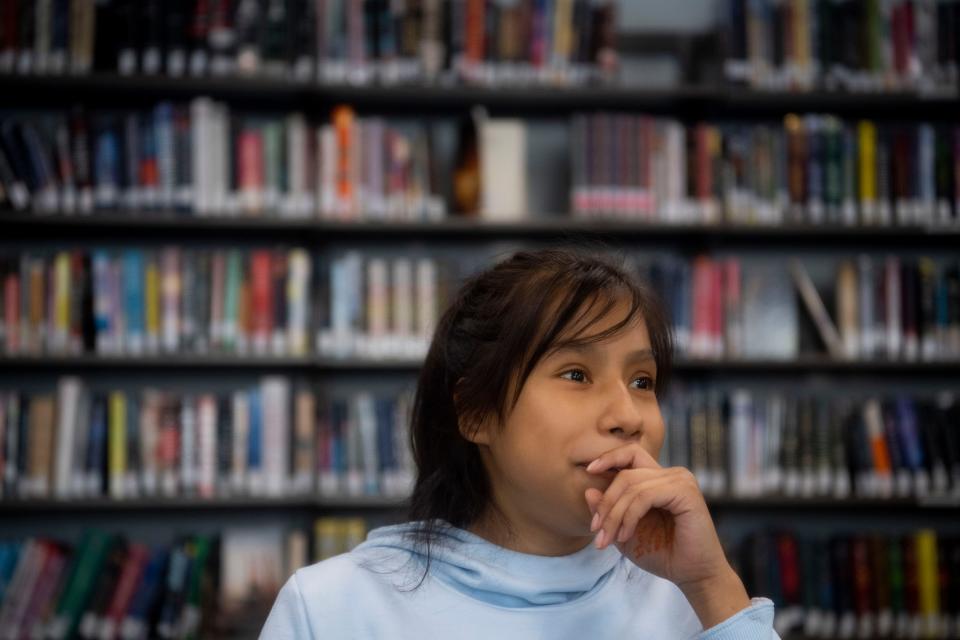
She said she felt like it was futile to try to correct the media, so she became the queen with cerebral palsy. CDA is nothing like cerebral palsy.
When you ask her about her life, she'll tell you how uneventful it was. She had lots of hospital appointments, but that was about it. She mostly kept to herself during her early teenage years. She didn't have friends.
"I used to be alone," she said. "I didn't like to talk to people."
Since she was given the crown, Roque said she talks to other students every day. People reach out to her on social media. She is well-known now in Dekalb County.
"It changed my life," Roque said in tears.
Football was once the focus
At Dallas' Place, a restaurant with a mostly white clientele, where their trust in God is written on the wall where two rifles hang, the manager and a waitress get big smiles when they talk about the Crossville homecoming queen who gave up her crown to the girl in a wheelchair.
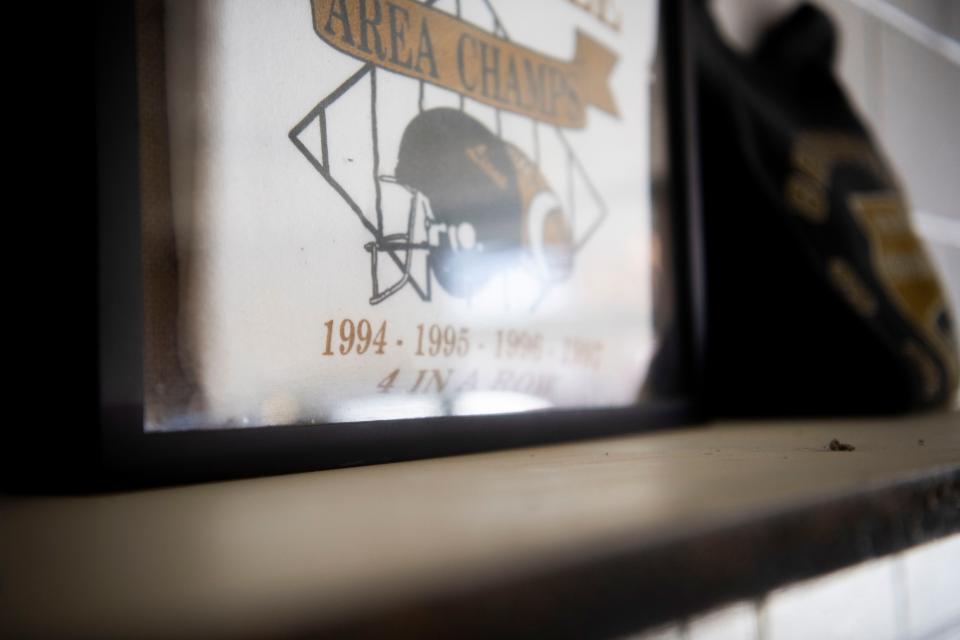
"It was so sweet of her to do that," said manager Kathy Stratton, showing off the goosebumps on her forearm.
Across the room, sitting at what the locals call the Liars Table, Dallas Petty (the man for whom the restaurant is named), said that moment was "fantastic." Then he pauses ... "The whole homecoming court was Hispanic." He was not lying.
Petty says he and the boys around the Liars Table hope the sports rumors aren't true. Crossville may not have a football program next year because they don't have enough players to field a team. (As of now, Principal Peppers says he still hasn't made a decision, but he doesn't expect more than 20 Crossville boys to show any interest in American football.)
"We've got a good soccer team," Petty said. Again, not a lie. The Crossville Lions advanced to the state's Final Four in the 5A division last season.
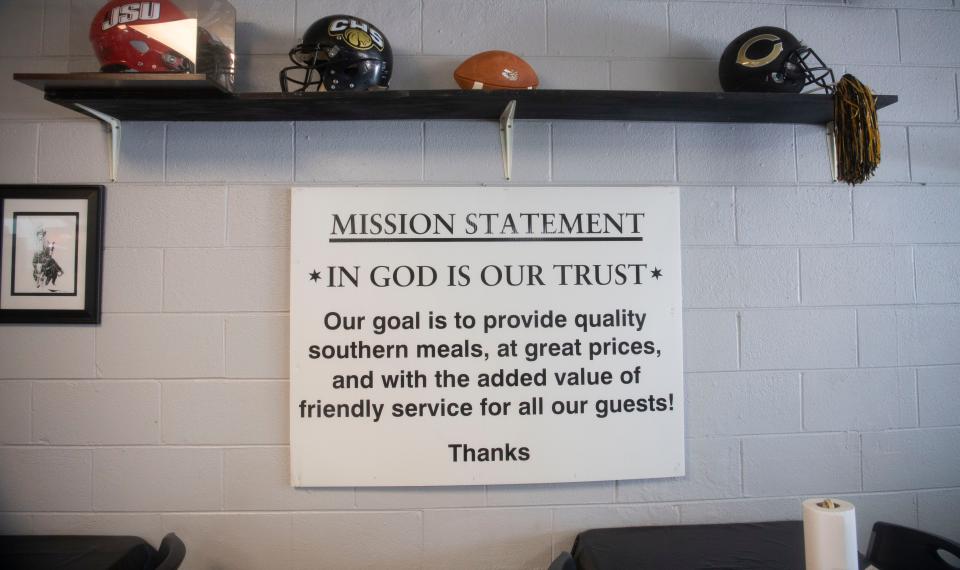
In Dallas' Place, you can almost hear the gridiron history. Crossville football helmets sit on shelves. There is a plaque commemorating the 1994, '95, '96 and '97 championship football seasons. For decades, Crossville has been known as the hometown of Richard Cole, the linebacker who starred on University of Alabama football teams that won National Championships in 1964 and '65. Cole died in August of 2022 just as the new football season was getting started.
It was a year in which Crossville did not win any of its 10 football games.
Dallas' Place, however, did not turn its back on Crossville's football team. In November, they hosted a football night in which they gave each player a free steak dinner.
"They committed themselves and they have not won a game," Stratton said. "No one is going to recognize them, so we thought we should."
Seeing an image of herself
Also from Kilpatrick, Ramos said she had observed Roque for years and saw an image of herself.
The homecoming crown switch has been brewing for months.
Ramos and other girls at Crossville High took note of Roque's loneliness.
"I didn't know how to carry a conversation," Ramos said.
She was an angry kid, moving to Kilpatrick with her mother after her parents split up.
"I didn't attempt to make friends," she said. "I was that lonely kid eating lunch at the end of the table."
Eventually, she began to socialize. Ramos' grades have always been stellar (she said she's never received anything lower than an A in high school), she is on the volleyball team and she tutors other students after school. She is going to apply for college at Auburn and Alabama, hoping to land enough scholarship money to afford tuition.
Ramos said she was stunned when she was nominated for homecoming queen. Immediately though, she and the other members of the court decided that whoever won, they would give the crown to Roque.
"She deserves it," Ramos said.
The homecoming court confided in one person: Principal Jon Peppers.
Crossville High is at the center of change
Peppers is a big guy, a former girls basketball coach.
He's soft spoken with the demeanor of a country preacher. His office has pictures of his friend, legendary University of Tennessee basketball coach Pat Summit.
He's been at Crossville for 28 years − the last six as principal.
It is clear within the first minute of talking to Peppers, he appreciates his students and the parents who brought them to Dekalb County. Crossville has about 640 students, with a yearly graduating class of about 140.
"They're coming to better themselves," Peppers said. "And they want better for their kids."
Peppers doesn't have many football victories to brag about, but he can quickly rattle off other facts about his school − 36 students passed the AP exam last year, 35 percent went to college and 100 percent qualify for a free lunch program.
"We've had one fight in six years," he said proudly. Crossville has been nominated in Alabama as a "School of Excellence."
He gets about 40 new undocumented students (they are called SLIFEs, or Students with Limited or Interrupted Formal Education) each year who come from Central America, and his school only has four bilingual teachers.
In his six years, 85 percent of the teachers either left or were asked to leave by Peppers. He considers his words carefully before he answers the question: Why?
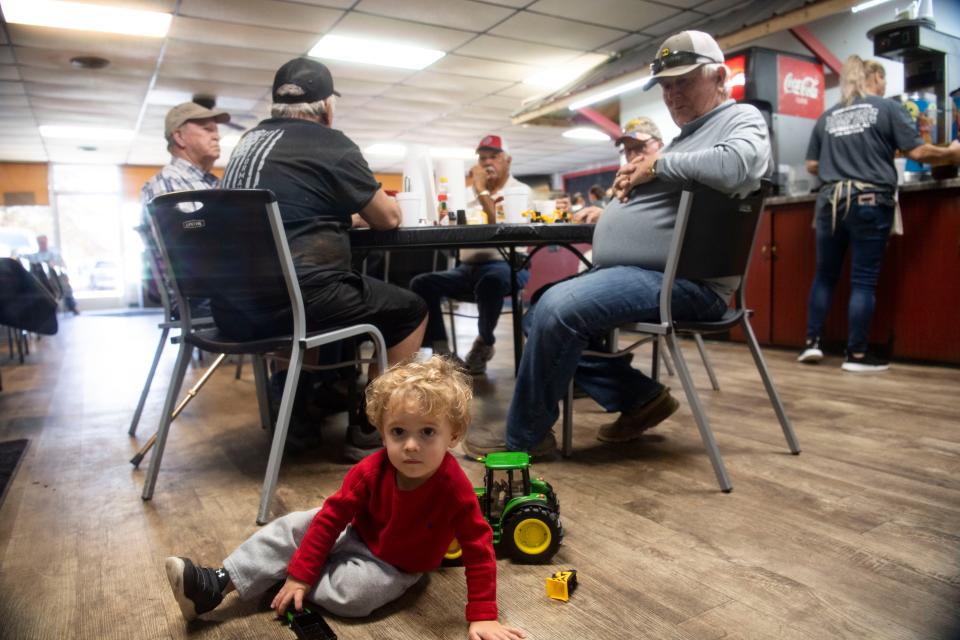
"They didn't feel up to the task of working with an 85 percent Latino school," he said. "We need the right type of people."
One teacher who did feel up to the task is Isaac Dismuke.
He teaches Spanish, English as a Second Language and is the soccer coach. He graduated from Crossville in 2012.
Every Sunday, he goes to La Guelaguetza, a Mexican restaurant in Kilpatrick and buys a basket full of tacos. He takes the food to "La Loma," a Kilpatrick park and plays soccer with children, high school students and some of their parents. They all eat together after the game.
"We've got two towns going on here, and I want to build a bridge," he said.
There have been times when his team's soccer matches are attended by more people, mostly Kilpatrick residents, than football games. Occasionally, he notices older white men from Crossville in the stands.
"One time, a guy came up to me and said, 'I don't understand everything that's going on, but I like it,'" Dismuke explained.
One person was missing from the crowd
On the day of the homecoming game, only Jon Peppers knew the final tally of the votes. He knew Juleydi Ramos had won. He also knew she wanted to give the crown away.
So he wrote two scripts for the stadium announcer.
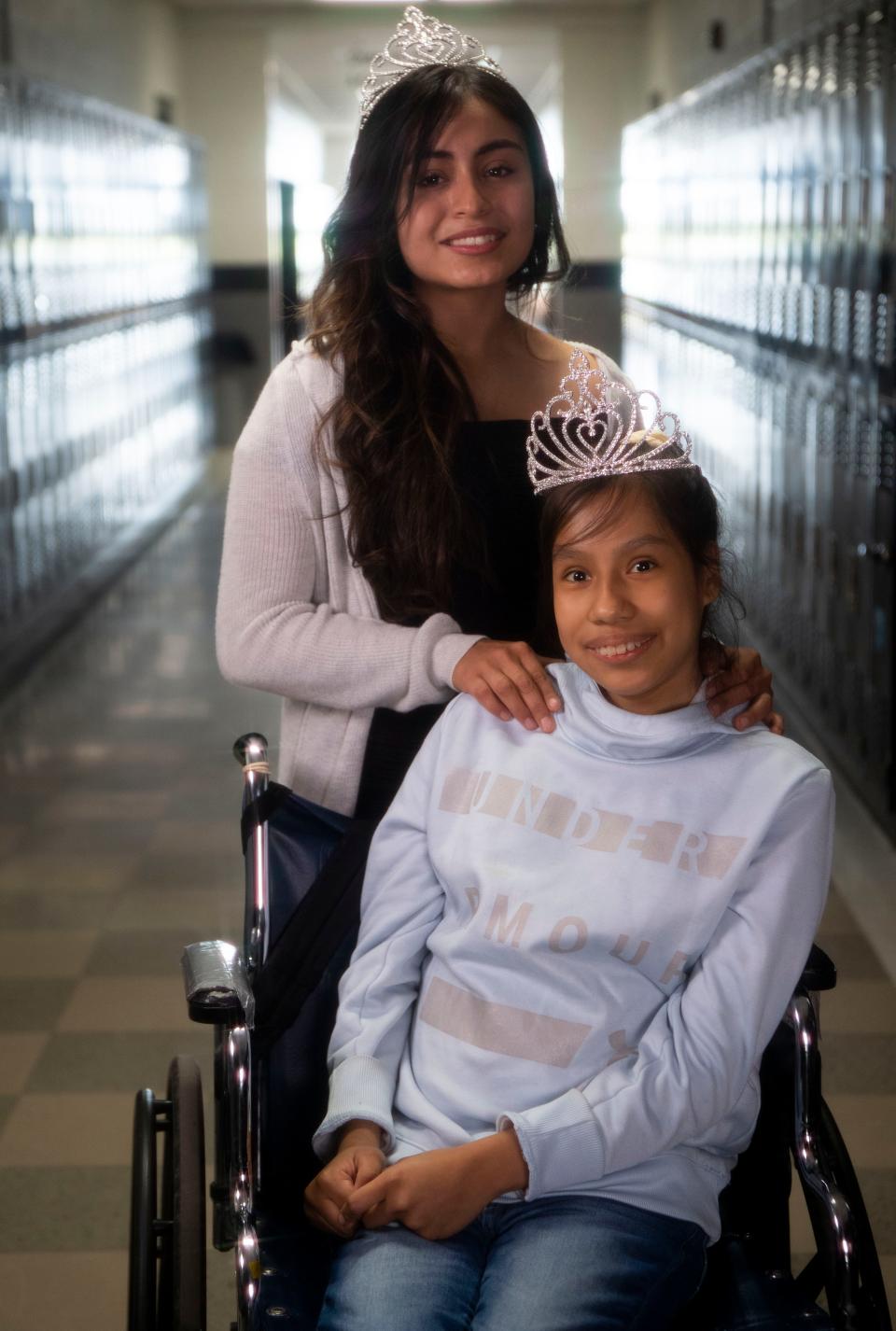
When Ramos' name was called, Peppers was standing nearby. He asked her one last time if she wanted to give away the crown.
She nodded.
So Peppers raised two fingers to the announcer, meaning he should read from the second script.
What no one knew was Ramos was hurting that night. She had about a dozen relatives in the stands. But her father was not there to see this.
His name was Armando Franco. He had gone to Mexico to visit his parents and died suddenly in June.
"I didn't get to attend his funeral," Ramos said in tears.
She was thinking about her father that night as she took off her crown and handed it to the girl who needed it more than she did. He would have been proud.
In the stands, Elia Ramos, Juleydi's mother, was caught by surprise. She didn't know her daughter was going to do what she did.
"I couldn't believe it," Elia Ramos said, with her daughter translating.
She said it was difficult to keep the camera steady because she was trying to hold back tears.
And then she turned around in the stands.
Everyone was crying.
That’s when she lost it.
Through her tears, she looked at the principal, who was also crying.
"This is my daughter," she said. "This is Juleydi. No matter how difficult things are for you, you always do for others."
This article originally appeared on USA TODAY: How the kindness of two teens is helping a small town cope with change


